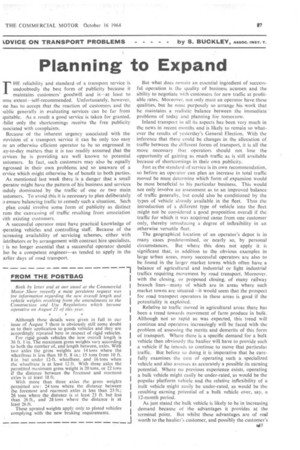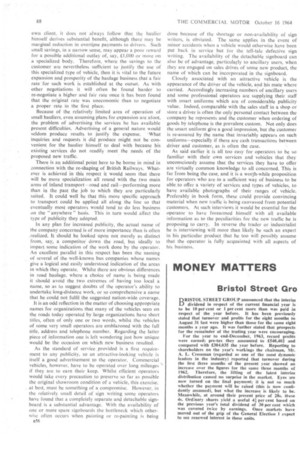Planning to Expand
Page 89

Page 90

If you've noticed an error in this article please click here to report it so we can fix it.
THE reliability and standard of a transport service is undoubtedly the best form of publicity because it maintains customers' goodwill and is—at least to nine extent—self-recommended. Unfortunately, however, flie has to accept that the reaction of customers and the
■ ublic generally in evaluating, services can be far from quitable. As a result a good service is taken for granted, rhilst only the shortcomings receive the free publicity ssociated with complaints.
Because of the inherent urgency associated with the ,rovision of a transport service it can be only too easy or an otherwise efficient operator to be so engrossed in ay-to-day matters that it is too readily assumed that the ervices he is providing are well known to potential ustomers. In fact, such customers may also be equally ngrossed in their own problems and so unaware of a ervice which might otherwise be of benefit to both parties.
As mentioned last week there is a danger that a small perator might have the pattern of his business and services induly dominated by the traffic of one or two main ustorners. To avoid this it is necessary to plan deliberately a ensure balancing traffic to remedy such a situation. Such plan could involve some form of publicity as distinct win the canvassing of traffic resulting from association vith existing customers.
A successful operator must have practical knowledge of iperating vehicles and controlling staff. Because of the acreasing availability of servicing schemes, either with istributors or by arrangement with contract hire specialists, t is no longer essential that a successful operator should lso be a competent engineer—as tended to apply in the arlier days of road transport.
But what does remain an essential ingredient of successful operation is the quality of business acumen and the ability to negotiate with customers for new traffic at profitable rates. Moreover, not only must an operator have these qualities, but he must purposely so arrange his work that he maintains a realistic balance between the immediate problems of today and planning for tomorrow.
Inland transport in all its aspects has been very much in the news in recent months and is likely to remain so whatever the results of yesterday's General Election. With the inference that there could be changes in the allocation of traffic between the different forms of transport, it is all the more necessary that operators should not lose the opportunity of gaining as much traffic as is still available because of shortcomings in their own publicity.
Just as the standard of service is its own recommendation, so before an operator can plan an increase in total traffic moved he must determine which form of expansion would be most beneficial to his particular business. This would not only involve an assessment as to an improved balance of traffic generally, but could also be conditioned by the types of vehicle already available in the fleet. Thus the introduction of a different type of vehicle into the fleet might not be considered a good proposition overall if the traffic for which it was acquired came from one customer only, thereby introducing a degree of inflexibility in an otherwise versatile fleet.
The geographical location of an operator's depot is in many cases predetermined, or nearly so, by personal circumstances. But where this does not apply it is significant that, in addition to the obvious examples in large urban areas, many successful operators are also to be found in the larger market towns which often have a balance of agricultural and industrial or light industrial traffics requiring movement by road transport. Moreover, with the closing, or proposed closing, of many railway branch lines—many of which are in areas where such market towns are situated—it would seem that the prospect for road transport operators in these areas is good if the potentiality is exploited.
Relative to traffic moved in agricultural areas there has been a trend towards movement of farm produce in bulk. Although not so rapid as was expected, this trend will continue and operators increasingly will be faced with the problem of assessing the merits and demerits of this form of transport. Where there is a specific demand for a bulk vehicle then obviously the haulier will have to provide such a vehicle if he intends to continue to move that particular traffic. But before so doing it is imperative that he carefully examines the cost of operating such a specialized vehicle and also assesses as accurately a possible its earning potential. Where no previous experience exists, operating a bulk vehicle might easily be under-rated, as would be the popular platform vehicle and the relative inflexibility of a bulk vehicle might easily be under-rated, as would be the resulting earning potential of a bulk vehicle over, say, a I2-month period.
As just stated the bulk vehicle is likely to be in increasing demand because of the advantages it provides at the terminal point. But whilst these advantages are of real worth to the haulier's customer, and possibly the customer's own client, it does not always follow that the haulier himself derives substantial benefit, although there may be marginal reduction in overtime payments to drivers. Such small savings, in a narrow sense, may appear a poor reward for a possible additional outlay of, say, £1,000 or more on a specialized body. Therefore, where the savings to the customer are nevertheless sufficient to justify the use of this specialized type of vehicle, then it is vital to the future expansion and prosperity of the haulage business that a fair rate *for such work is established at the outset. As with other negotiations it will often be found harder to re-negotiate a higher and fair rate once it has been found that the original rate was uneconomic than to negotiate a proper rate in the first place.
Because of the relatively limited area of operation of small hauliers, even assuming plans for expansion are afoot, the problem of advertising the services he has available present difficulties. Advertising of a general nature would seldom produce results to justify the expense. 'What inquiries and requests it did produce might not be convenient for the haulier himself to deal with because his existing services do not readily meet the needs of the proposed new traffic.
There is an additional point here to be borne in mind in connection with the re-shaping of British Railways. Whatever is achieved in this respect it would seem that there will be more specialization all round with the two main arms of inland transport—road and rail—performing more than in the past the job to which they are particularly suited. It could well be that this more specific approach to transport could be applied all along the line so that eventually most operators would tend to do less business on the " anywhere " basis. This in turn would affect the type of publicity they adopted.
In any plan for increased publicity, the actual name of the company concerned is of more importance than is often :realized. It should be looked upon not merely as distinct from, say, a competitor down the road, but ideally to impart some indication of the work done by the operator. An excellent parallel in this respect has been the naming of several of the well-known bus companies whose names give a logical and easily understood indication of the areas in which they operate. Whilst there are obvious differences in road haulage, where a choice of name is being made it should avoid the two extremes of having too local a name, so as to suggest doubts of the operator's ability to undertake long-distance work, or so comprehensive a name that he could not fulfil the suggested nation-wide coverage.
It is an odd reflection in the matter of choosing appropriate names for organizations that many of the vehicles seen on the roads today operated by large organizations have short titles, often of only one or two words, whilst the vehicles of some very small operators are emblazoned with the full title, address and telephone number. Regarding the latter piece of information one is left wondering just how unique would be the occasion on which new business resulted.
As the standard of service provided is a first requirement to any publicity, so an attractive-looking vehicle is itself a good advertisement to the operator. Commercial vehicles, however, have to be operated over long mileages N's if they are to earn their keep. Whilst efficient operators would take every precaution to preserve so far as possible the original showroom condition of a vehicle, this exercise, at best, must be something of a compromise. However, in the relatively small detail of sign writing some operators have found that a completely separate and detachable signboard is a substantial advantage. With the availability of one or more spare signboards the bottleneck which otherwise often occurs when painting or re-painting is being
a56
done because of the shortage or non-availability of sign writers, is obviated. The same applies in the 'event of minor accidents when a vehicle would otherwise have been put back in service but for the tell-tale defective sign writing. The availability of the detachable signboard can also be of advantage, particulaily to ancillary users, when they are engaged on sales drives of some new product, the name of which can be incorporated in the signboard.
Closely associated with an attractive vehicle is the appearance of the driver of the vehicle, and his mate where carried. Accordingly increasing numbers of ancillary users and some professional operators are supplying their staff with smart uniforms which are of considerable publicity value. Indeed, comparable with the sales staff in a shop or store a driver is often the only personal contact between the company he represents and the customer when ordering of goods by telephone is the prevalent custom. Not only does the smart uniform give a good impression, but the customer is re-assured by the name that invariably appears on such uniforms—especially if there are cash transactions between driver and customer, as is often the case.
As said earlier it is all too easy for operators to be so familiar with their own services and vehicles that they unconsciously assume that the services they have to offer are virtually common knowledge to all concerned. This is far from being the case, and it is a worth-while proposition for operators who are in a sufficient way of business to be able, to offer a variety of services and types of vehicles, to have available photographs of their ranges of vehicle. Preferably in book form, these could provide convincing material when new traffic is being canvassed from potential customers. At such interviews it would be essential for the operator to have forearmed himself with all available information as to the peculiarities for the new traffic he is proposing to carry. In reverse the trader or industrialist he is interviewing will more than likely be such an expert in his particular product that he too will possibly assume that the operator is fully acquainted with all aspects of his business.




































































































































